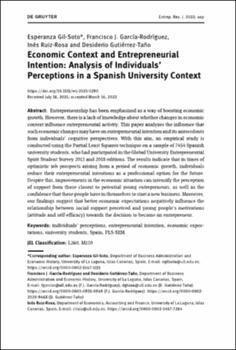Economic context and entrepreneurial intention: analysis of individuals' perceptions in a spanish university context.
Date
2022Abstract
Entrepreneurship has been emphasized as a way of boosting economic
growth. However, there is a lack of knowledge about whether changes in economic
context influence entrepreneurial activity. This paper analyzes the influence that
such economic changes may have on entrepreneurial intention and its antecedents
from individuals’ cognitive perspectives. With this aim, an empirical study is
conducted using the Partial Least Squares technique on a sample of 7454 Spanish
university students, who had participated in the Global University Entrepreneurial
Spirit Student Survey 2013 and 2018 editions. The results indicate that in times of
optimistic job prospects arising from a period of economic growth, individuals
reduce their entrepreneurial intentions as a professional option for the future.
Despite this, improvements in the economic situation can intensify the perception
of support from those closest to potential young entrepreneurs, as well as the
confidence that these people have in themselves to start a new business. Moreover,
our findings suggest that better economic expectations negatively influence the
relationship between social support perceived and young people’s motivations
(attitude and self-efficacy) towards the decision to become an entrepreneur.





